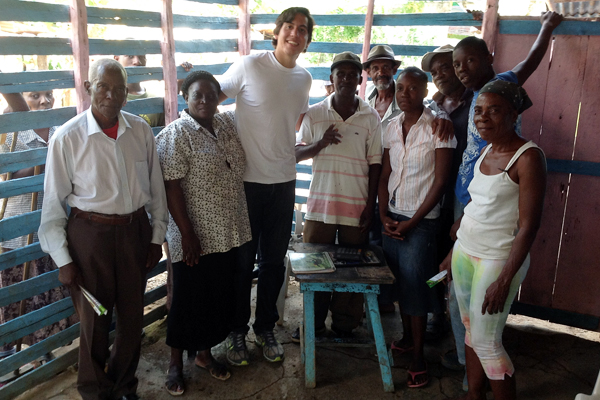Fighting poverty with social business

Venezuela-born Northeastern student Juan Pena Salas completed a Dialogue of Civilizations program in the Dominican Republic and then stayed for another five months, continuing his humanitarian work in an impoverished community.
He did the Dialogue through the Social Enterprise Institute, building a small, sustainable farm to help a village inch closer toward prosperity. “It was incredible seeing that kind of poverty,” said Pena Salas, a third-year student studying accounting and global social entrepreneurship in the D’Amore-McKim School of Business. “I knew these people were poor, but I was not expecting anything like what we saw.”
After the Dialogue ended, he found a co-op with Esperanza International, a nonprofit microfinance organization. He worked both in the field and at corporate headquarters, collaborating with loan officers, collecting important data, and using his accounting expertise to prepare the organization’s annual financial report.
“I felt I was an essential part of the company,” Pena Salas said of the experiential learning opportunity. “I may have been there on co-op, but I was talking to the CEO and the general manager and the CFO, who relied on me to do important work.”
Pena Salas saw firsthand how small loans could make an enormous impact in the lives of extremely poor people in the developing world.
“We have thousands of clients who have been able to buy homes and send their kids to school,” Pena Salas said. “Most of our clients are women and for them these loans were a dream come true—a tool that could lift them out of poverty bit by bit.”
Many of the people who benefit from microloans have the skills and bright ideas for starting a business, but lack the funds for basic expenses, like ingredients for a bakery or seeds for a farm. “I saw a woman who started with nothing and she got a loan to start selling cakes,” Pena Salas said. “And now she’s running her own bakery.”
Pena Salas wants to pursue a career in social business, but hopes to do his next co-op in the corporate sector, where he can solidify his finance and accounting skills.
“You need to know all the same things, even though you might be using some of the skills in different ways,” he said.
Pena Salas returned to the small village in the Dominican Republic before Christmas to check in, armed with a large supply of clothing and an eagerness to help out. The farm has remained profitable, despite some serious flooding.
“We know we’re working to make a difference,” said Pena Salas, who has begun planning for another group of students to visit the village. “We’re doing this for a reason.”





